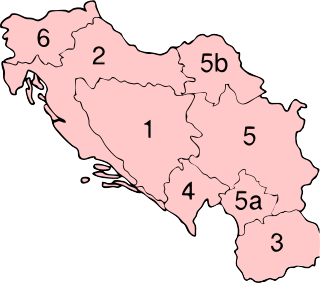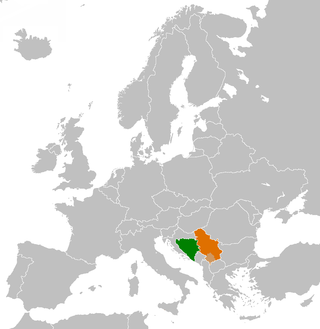Related Research Articles

The Informbiro period was an era of Yugoslavia's history following the Tito–Stalin split in mid-1948 that lasted until the country's partial rapprochement with the Soviet Union in 1955 with the signing of the Belgrade declaration. After World War II in Yugoslavia, Yugoslavia's new leadership under Josip Broz Tito pursued a foreign policy that did not align with the Eastern Bloc. Eventually, this led to public conflict, but the Yugoslav leadership decided not to acquiesce to Soviet demands, despite significant external and internal pressures. The period saw the persecution of the political opposition in Yugoslavia, resulting in thousands being imprisoned, exiled, or sent to forced labour. 100 Yugoslav citizens were seriously wounded or killed between 1948 and 1953 while some sources claim 400 victims during the existence of Goli otok prison camp. The purges included a significant number of members of Yugoslavia's security apparatus and its military.
The economy of the Socialist Federal Republic of Yugoslavia (SFRY) was a unique system of socialist self-management that operated from the end of World War II until the country's dissolution in the 1990s. The Yugoslav economy was characterized by a combination of market mechanisms and state planning, with a focus on worker self-management and a decentralized approach to decision-making. Despite facing numerous challenges, including political instability and external pressures, the Yugoslav economy achieved significant growth and modernization during its existence, with a particularly strong emphasis on education, health care, and social welfare. However, the system ultimately proved unsustainable in the face of the global economic changes of the 1980s and the political tensions that led to the breakup of Yugoslavia in the 1990s. Despite common origins, the Yugoslav economy was significantly different from the economies of the Soviet Union and other Eastern European socialist states, especially after the Yugoslav-Soviet break-up in 1948.

After a period of political and economic crisis in the 1980s, the constituent republics of the Socialist Federal Republic of Yugoslavia split apart in the early 1990s. Unresolved issues from the breakup caused a series of inter-ethnic Yugoslav Wars from 1991 to 2001 which primarily affected Bosnia and Herzegovina, neighbouring parts of Croatia and, some years later, Kosovo.

David Henry Fromkin was an American historian, best known for his interpretive account of the Middle East, A Peace to End All Peace (1989), in which he recounts the role European powers played between 1914 and 1922 in creating the modern Middle East. The book was a finalist for both the National Book Critics Circle Award and the Pulitzer Prize for General Nonfiction. Fromkin wrote seven books, ending in 2007 with The King and the Cowboy: Theodore Roosevelt and Edward the Seventh, Secret Partners.

Ilirida or the Republic of Ilirida is a proposed state in the western regions of North Macedonia, declared twice by the politician Nevzat Halili, once in 1992 and again in 2014. The proposal has been declared unconstitutional by the Macedonian government. The secessionist concept of Ilirida emerged in the early 1990s and was advocated by some Albanian politicians as a solution to concerns and disputes the Albanian community had regarding constitutional recognition and minority rights within Macedonia.
United Nations Security Council resolution 749, adopted unanimously on 7 April 1992, after reaffirming resolutions 713 (1991), 721 (1991), 724 (1991), 727 (1992), 740 (1992) and 743 (1992), the Council approved of a report by the Secretary-General Boutros Boutros-Ghali and decided to authorise the earliest possible deployment of the United Nations Protection Force (UNPROFOR) in the former Yugoslavia.

United Nations Security Council resolution 843, adopted unanimously on 18 June 1993, after reaffirming Resolution 724 (1991) and Article 50 of the United Nations Charter, the council was conscious of the fact that an increasing number of requests for assistance have been received under Article 50.
United Nations Security Council resolution 844, adopted unanimously on 18 June 1993, after reaffirming Resolution 713 (1991) and subsequent resolutions, the Council noted deteriorating situation in Bosnia and Herzegovina and authorised a reinforcement of the United Nations Protection Force (UNPROFOR).

United Nations Security Council resolution 847, adopted unanimously on 30 June 1993, after reaffirming Resolution 743 (1992) and subsequent resolutions relating to the United Nations Protection Force (UNPROFOR), the council condemned military attacks in Croatia and Bosnia and Herzegovina and extended the mandate of UNPROFOR until 30 September 1993.

United Nations Security Council resolution 870, adopted unanimously on 1 October 1993, after reaffirming Resolution 743 (1992) and subsequent resolutions relating to the United Nations Protection Force (UNPROFOR), the council, acting under Chapter VII of the United Nations Charter, extended UNPROFOR's mandate for additional period terminating 5 October 1993.

United Nations Security Council resolution 871, adopted unanimously on 4 October 1993, after reaffirming resolutions 713 (1992) and 743 (1992) and subsequent resolutions relating to the situation in the former Yugoslavia and United Nations Protection Force (UNPROFOR), the Council expressed concern that United Nations peacekeeping plan for Croatia, in particular Resolution 769 (1992), had not been implemented and went on to discuss the peace plan and extend UNPROFOR's mandate until 31 March 1994.
United Nations Security Council resolution 908, adopted unanimously on 31 March 1994, after reaffirming all resolutions on the situation in the former Yugoslavia and in particular Resolution 871 (1993), the council extended the mandate of the United Nations Protection Force (UNPROFOR) until 30 September 1994 and declared its intention to increase the number of personnel in the peacekeeping force.
United Nations Security Council resolution 914, adopted unanimously on 27 April 1994, after recalling resolutions 908 (1994) and 913 (1994), the council, acting under Chapter VII of the United Nations Charter, increased the strength of the United Nations Protection Force (UNPROFOR) by up to 6,550 additional troops, 150 military observers and 275 civilian police monitors.

United Nations Security Council resolution 936, adopted unanimously on 8 July 1994, after reaffirming resolutions 808 (1993) and 827 (1994), the Council appointed Richard Goldstone, a judge at the Constitutional Court of South Africa, as Prosecutor at the International Criminal Tribunal for the former Yugoslavia (ICTY).

United Nations Security Council resolution 943, adopted on 23 September 1994, after reaffirming all resolutions on the situation in Bosnia and Herzegovina, the Council suspended some restrictions against the Federal Republic of Yugoslavia and discussed the closure of the border between both countries.

United Nations Security Council resolution 947, adopted unanimously on 30 September 1994, after recalling all resolutions on the situation on the former Yugoslavia including Resolution 908 (1994), the Council discussed the situation in Croatia and extended the mandate of the United Nations Protection Force (UNPROFOR) until 31 March 1995.
United Nations Security Council resolution 967, adopted unanimously on 14 December 1994, after recalling all resolutions on the situation in the former Yugoslavia, in particular Resolution 757 (1992) and receiving letters from the chairman of the security council committee established in Resolution 727 (1992) and the United Nations Children's Fund which noted a resurgence in diphtheria and that the only available stocks of anti-serum to combat the condition were located in Serbia and Montenegro, the council, acting under Chapter VII of the United Nations Charter, authorised the export of 12,000 vials of diphtheria anti-serum from the country for a period of 30 days.
The Sandžak faction or Sandžak lobby, known in Bosnian as Sandžaklije, was one of the two main divisions of the Bosnian government and the ruling Party of Democratic Action (SDA) during the Bosnian War. It was made up of military hardliners and settlers (migrants) from Sandžak, a region divided between SR Serbia and SR Montenegro. Commander Sefer Halilović and politician Ejup Ganić belonged to the faction.
In June 1991, representatives of Bosnian Muslims and Bosnian Serbs met to discuss the future status of SR Bosnia and Herzegovina during the Yugoslav crisis.
Bit Pazar shooting or Bit Pazar incident took place on 6 November 1992. At the time, it was an event that weakened the stability of Macedonia and raised the possibility of an outbreak of armed conflict between ethnic Albanians and Macedonians in the country.
References
- ↑ "Socialist Unemployment by Susan L. Woodward | Books Introduction". Archived from the original on January 21, 2013. Retrieved August 14, 2012.
- ↑ CUNY Graduate Center, Faculty Profiles
- ↑ Woodward, Susan Lampland (1975). Training for self-management patterns of authority in Yugoslav secondary schools.
- ↑ CUNY Graduate Center, Recently Appointed Graduate Center Faculty: 1999–2009